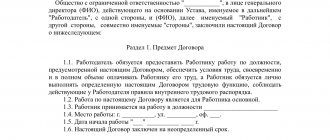Home / Labor Law / Employment / Employment contract
Back
Published: 07/14/2016
Reading time: 7 min
0
1420
The concept of “contract” or “agreement” is quite often found in labor and federal legislation as a definition related to labor relations. Initially, agreements were oral agreements between interested parties. And contracts implied the written signing of a document stipulating all the terms of the transaction or employment relationship.
In the Soviet Union, no special distinction was made between these concepts. But in the new Russian labor legislation, the word “contract” was replaced in all its references by “agreement”.
In the broad sense of the word, a contract can be considered both an oral and a written transaction. There is practically no legal difference between an agreement and a contract . However, there are still differences, and they are related to the wording used in legal and regulatory documents.
- Legislation: definition of concepts
- What are the differences?
- Service contracts and employment contracts: differences
Labor contract
Many people believe that there are no differences between the concepts of “employment contract” and “employment contract”, but this is not entirely true. As is known, current regulations impose fairly strict requirements regarding the information that must be included in employment agreements. In this case, the employment contract must contain the most clear and unambiguous conditions for the future work of the new employee. This can also include his main professional obligations, which will come into force at the moment the document is signed by the parties. In case of non-fulfillment or improper fulfillment of these obligations, the employer will have the legal right to apply certain disciplinary measures.
Another important characteristic of an employment contract is the fact that during its conclusion the parties must be guided exclusively by the provisions of the current civil legislation. This rule applies because the procedure for concluding an employment contract itself is a civil law transaction. Consequently, after signing a document, the provisions of the Labor Code of the Russian Federation cannot be applied to it.
It should be noted that the very concept of an employment contract has not appeared in current labor standards for quite a long time - since 2002. Despite this, the concluded agreement will regulate the main issues of labor relations, including:
- procedure for hiring individuals. Their main obligations, the exact amount of regular payment, as well as other basic information are indicated here;
- procedure for severing previously established professional relationships. Any contract must contain information on exactly what grounds an employee can be dismissed. This includes both the employee’s own desire and the unilateral decision of his superiors.
When concluding an employment agreement at the next place of work, absolutely every citizen must pay attention to what kind of document is being signed with him - an agreement or a contract. This is to avoid any possible disputes in the future.
Working without a work book: advantages and disadvantages
Carrying out work duties without a work book can be carried out in a number of cases - for example, during evening work, when working in free time from the main activity.
There are a number of advantages to doing this:
- Usually, non-labor work implies a flexible schedule, in which the employee determines the time for performing duties and rest;
- despite the absence of notes in the work record, it is possible to prove the period of time worked on the basis of a work contract, which allows you to establish length of service and calculate a pension;
- such work is beneficial for pensioners, since in this case the size of the pension is not cut.
However, there are many more disadvantages:
- there are no paid sick leaves, vacations, maternity benefits, or work-related injuries;
- experience is not accrued, which will not allow you to confirm your experience when applying for a new job;
- no bonuses;
- there is no guarantee that the employer pays medical and pension contributions (this is his responsibility, but he does not bear responsibility);
- the worker must independently pay taxes on the earnings received;
- the employment contract can be terminated at any time before its expiration;
- there is a risk that in case of illegal and groundless dismissal, the employee will not be able to receive the salary due to him;
- An employee can receive a fine at any time.
What is the fine for an unregistered employee?
Thus, working in the absence of a work book does not fully protect human rights at the legislative level. However, it is not difficult to find a vacancy where it is not required, since many employers seek to protect themselves from the bureaucratic hassle of properly registering an employee.
Service contract
A service contract is a special agreement that can be concluded between an individual wishing to perform civil service, as well as a representative of a government agency. In accordance with the current rules, the content of such a document must also include all important nuances that are directly related to future relations. The main ones include the following:
- Basic rules for entry into the civil service, as well as its subsequent passage.
- Rights and obligations that are assigned to each party at the time of direct signing of this document.
It should be noted right away that the current labor legislation will also have absolutely no impact on the created service contract. As for the procedure and features of regulation of this document, it is carried out on the basis of various federal laws and other existing regulations.
If we talk about the main reasons why a previously concluded contract may be terminated, these include the following:
- End of the validity period of the concluded contract. In accordance with general rules, any service contract must contain information regarding the exact period of its validity. In this case, the expiration of this period will automatically mean that the contract is terminated.
- If one of the parties violated important terms of the concluded contract. For example, an employer may violate its own obligations to pay employees on time. Or vice versa - an employee may violate the provisions of the contract in terms of high-quality performance of assigned professional functions.
- The very content of the agreement contradicts current standards in the field of labor protection. In this case, absolutely all clauses of the previously concluded agreement will be declared invalid.
- Other events that turn out to be direct obstacles to the continuation of the parties’ work under this agreement.
Either party can initiate the cancellation of the contract. However, if we are talking about an employer, then he will need compelling reasons to unilaterally dismiss an employee. Otherwise, the entire dismissal procedure will be considered invalid.
Service contract
This is a separate type of legal document that establishes the rules of the relationship between the employer and the future state or municipal employee. This type of documentation is enshrined in Article 23 of Law No. 79-FZ of July 27, 2004 (as amended on December 28, 2017).
The contract with the employee stipulates his obligations to fulfill job descriptions according to special regulations. And the employer undertakes to promptly and in full pay state (municipal) maintenance, provide guarantees and compensation provided for by current legislation.
Breaking the TC is permissible in the following cases:
- expired;
- labor protection rules were violated;
- a civil servant was injured to the point of death;
- due to violation of discipline;
- failure to fulfill assigned duties.
Please note that a contract must be concluded with employees employed in the state or municipal service instead of an employment contract.
Current sample
The difference between a service contract and an employment contract
If we talk about a service contract and an employment contract, there are several main differences between these two documents:
- Direct sources of regulation. As mentioned above, the procedure for concluding and terminating a service contract is regulated by separate legislative provisions that have nothing to do with labor standards. As for the employment contract, all issues related to it are subject to regulation by the current norms of the Labor Code of the Russian Federation.
- The terms for which the documents are concluded. The service contract must have clear information in the appropriate section regarding the period of validity of this document. If we talk about an employment contract, in most cases it is unlimited. Moreover, in order to enter into such an agreement with a limited period of validity, the employer must have compelling reasons for this action.
As for other aspects, in other respects the two above documents are quite similar.
What are the differences?
The Civil and Budget Code points to a contract as the main type of document required when concluding a transaction if one of the interested parties is the state. It clearly states the procedure for concluding and the conditions under which the transaction takes place. For example, such a document is concluded based on the results of a tender for the supply of goods for municipal needs.
But this type of contract in its legal status is close to civil law type contracts (according to the Federal Law number 44, article 3, paragraph eight).
The Tax Code relates contracts to the sphere of foreign trade relations (Article 165 of the Tax Code). If a deal is concluded to export goods outside the Customs Union, a corresponding contract is signed. Such a document allows the interested party to receive significant tax benefits (zero rate). Using the agreement in such cases would be inappropriate, since signing the agreement would lead to problems with the tax service.
Thus, the difference between contracts and agreements lies in the origin of the concepts themselves and the status of the interested parties signing the agreement.
As mentioned above, the concept of “contract” cannot be confused with a fixed-term type agreement. According to the validity period, contracts concluded to regulate labor relations can have both a limited (fixed-term) and unlimited (indefinite) period of validity.
Speaking figuratively, an agreement is a general concept, and a contract is just a type of such agreements used in certain situations.
For example, a contract may confirm the fact of hiring law enforcement officers, civil servants or career military personnel (contract service). In the case of hiring a civil servant, the contract is used instead of an agreement. The Law on Civil Servants directly states that a contract is concluded between the employer and the future employee of a state organization (Article 23 of the mentioned Law).
Or certain services or work may be performed under a contract. In this case, the contract is close in legal meaning to a civil law type contract. Such a contract has a certain validity period and cannot be extended . Its termination occurs based on the reasons specified in the document. And the employer has the right to additional incentives for the employee for excellent performance of his duties (the amount of incentive remuneration and the procedure for its payment are also specified in the contract).
How sick leave is paid - complete information for you! Proper payroll calculation is very important. Find out about the important nuances of this process in our professional article. If you were sent on a business trip over the weekend, then you need our material!
The main differences between an employment contract and a contract
The main differences between these two documents include the following:
- Regulation by law. The employment contract is governed exclusively by the provisions of the Labor Code of the Russian Federation. As for the contract, it may be subject to regulation by other legal acts.
- Parties to the concluded agreement. When it comes to a standard employment agreement, the parties will always be the employee and the employer. As for the contract, in most cases the parties to this document are the customer and the contractor.
- Availability of various social guarantees. As is known, employees are entitled to various guarantees under their employment contracts, including the provision of paid leave, compensation for sick leave, etc. As for the contract, the contractor is not entitled to any special guarantees. He can only count on receiving timely payment for his own labor and services rendered.
- Direct subject of regulation. In a standard employment contract, this subject will always be the professional relationship between the employee and his employer, which arises at the moment of direct signing of the agreement. If we talk about a contract, the direct subject here will be the services that are provided by one party in favor of the other.
Employment agreement and contract: is there a difference?
An employment contract is a fixed-term type of contract.
If an employment contract is concluded for a period that is not clearly defined, then the contract is drawn up for a period from 1 to 5 years. If the employer decides to terminate the employment relationship before the expiration of the contract, he pays compensation to the employee.
Is it possible to work with two work books?
Termination of a contract before its expiration is possible solely at the initiative of the employer or if the employee grossly violates the conditions specified in the agreement. This is its difference from a contract, in which there are situations where the employer forces a subordinate to write a letter of resignation from his position at his own request. The contract can be terminated by both parties.
Why does such a question arise?
The whole point is that a contract is a much more rigid document than an agreement. “Contract” translated from Latin means “deal,” which emphasizes its specificity. The contract presupposes the assignment of obligations established on paper to the employer and employee, failure to fulfill which gives the injured party the full right to apply to court for damages.
The agreement in this sense has a rather symbolic meaning and contains only general formulations of rights and obligations. The document confirms that the employee is actually employed in the organization, and other aspects of his work are regulated by the Labor Code of the Russian Federation.
Thus, the signed contract significantly limits the employee’s actions, not allowing, for example, to resign at will, which, of course, is not to everyone’s liking. This is why you should pay attention to whether you are given a contract or agreement to sign when applying for a job, especially if you do not intend to stay in this organization for years.








